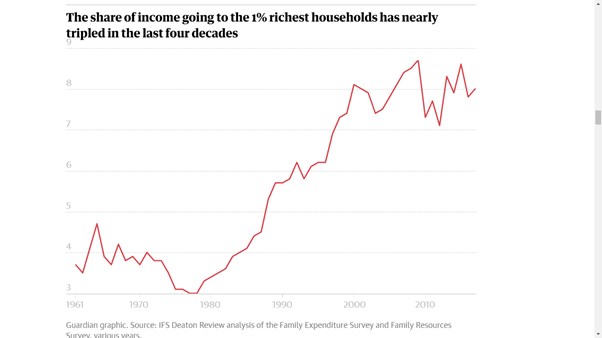In his Homily on 1 Timothy 12:3–4,71 the early church father St. John Chrysostom (died 407 CE) made the bold statement that "it is utterly impossible to be rich without committing injustice" (οὐκ ἔστιν οὐκ ἔστι μὴ ἀδικοῦντα πλουτεῖν) and moreover said that wealth is tantamount to theft, for ‘its origin must have come from an injustice against someone’, an ἀδικία (Timothy 1, 3, v.3, v. 8; 6, v.10; John Chrysostom in Schaff, 1886, Vol. 13, p.447). He then posed a rhetorical question: ‘Is this not an evil, that you alone should have the Lord’s property, that you alone should enjoy what is common?’, finally concluding: "Not to share one’s wealth with the poor is to steal from them and to take away their livelihood. It is not our own goods which we hold, but theirs" (Hom. in Lazaro 2,5).
Arguably, if you earned $5,000 a day every day, beginning in 1492 when Columbus discovered America, you would probably still have less money than Jeff Bezos. The richest 26 people in the world have as much wealth as the 50% most economically disadvantaged of the global population - all 3.5 billion of the planet's poorest. Jeff Bezos has personal income equivalent to the GDP of a number of sovereign countries, such as New Zealand.
Surely an economic system that enables such gross income disparities to not only exist but widen with every passing year, often to the detriment of the environment to boot, is an inherently 'unjust' one?
The counter-argument, from libertarian free-marketeers, is that the financially well-endowed are specially-talented wealth creators. Jeff Bezos created a service that billions of human beings wanted and so he reaps the dividends.
But the question of acquiring wealth and the question of keeping it are distinct. 'To be rich' is not just about acquisition but retention. Whereas Jeff Bezos has a net worth of $130 billion, George Soros has "only" $8 billion because he has donated more than $32 billion to philanthropic causes.
It’s one thing to claim you ascended the ranks of the 0.01% through talent, thrift and graft. It’s quite another to justify using that wealth for one's own private luxury, with plush houses and greco-roman sculptures of oneself rather than giving aid to people living hand-to-mouth in an effort to pay their exorbitant rents or dying without medical coverage from untreated malaria.
Is there a “maximum moral income” beyond which it’s inexcusable not to give away your superfluous money?
Arguably, if you earned $5,000 a day every day, beginning in 1492 when Columbus discovered America, you would probably still have less money than Jeff Bezos. The richest 26 people in the world have as much wealth as the 50% most economically disadvantaged of the global population - all 3.5 billion of the planet's poorest. Jeff Bezos has personal income equivalent to the GDP of a number of sovereign countries, such as New Zealand.
Surely an economic system that enables such gross income disparities to not only exist but widen with every passing year, often to the detriment of the environment to boot, is an inherently 'unjust' one?
The counter-argument, from libertarian free-marketeers, is that the financially well-endowed are specially-talented wealth creators. Jeff Bezos created a service that billions of human beings wanted and so he reaps the dividends.
But the question of acquiring wealth and the question of keeping it are distinct. 'To be rich' is not just about acquisition but retention. Whereas Jeff Bezos has a net worth of $130 billion, George Soros has "only" $8 billion because he has donated more than $32 billion to philanthropic causes.
It’s one thing to claim you ascended the ranks of the 0.01% through talent, thrift and graft. It’s quite another to justify using that wealth for one's own private luxury, with plush houses and greco-roman sculptures of oneself rather than giving aid to people living hand-to-mouth in an effort to pay their exorbitant rents or dying without medical coverage from untreated malaria.
Is there a “maximum moral income” beyond which it’s inexcusable not to give away your superfluous money?
Last edited:

